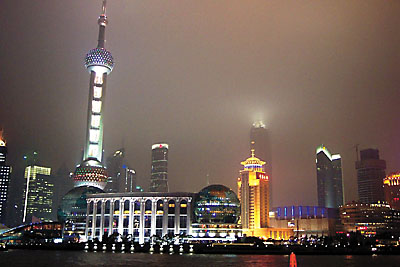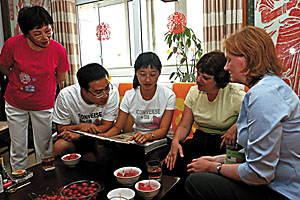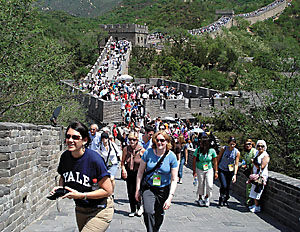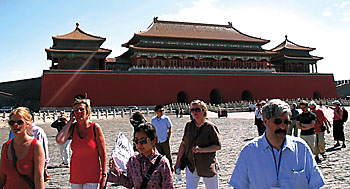 | The futuristic shapes of the Shanghai skyline at night "resembled a sci-fi movie," noted one student delegate. |
The following are impressions of the journey written by some of the participating Yale students. The full text of these writings and photos of the trip can be found online at www.yale.edu/chinatrip.
... We then headed to the Forbidden City, where we were able to spend about 60 minutes in a private garden that had been totally restored by master craftsmen and artists. This section is closed to the public, and is normally reserved for visiting dignitaries. We were there as the sun set, and the experience was magical. Throughout the trip, we viewed many of China's amazing historical artifacts. At this moment, however, we were able to live that history, to experience firsthand what it must have been like to be the emperor. ... (Roger Goldberg, Yale School of Medicine student and 2000 graduate of the Yale School of Management)
... [T]he delegates boarded the buses yet again and headed to a traditional Peking Opera performance. Everyone marveled at the skill of the performers as they applied their makeup, cringed at the high-pitched squeals of the female performers and laughed to themselves and together at the often-hilarious English translations of the show. Some delegates even nodded off for a quick nap, still trying to recover from jet lag or just worn out by the busy day. Others were still energized and ready to go, and shouts of "10:45 in the hotel lobby" were heard on every bus by those of us ready to show the students what a true Beijing night was like. ... (Erica Smith, Yale College Class of 2009)
... The iconic symbol of China's antiquity is the Great Wall, a megastructure that weaves from the countryside around Beijing to the southern edge of Inner Mongolia. ... According to legend, our tour guide explains, the beautiful Meng Jiang Nu married a man who was drafted into a work gang and sent to Northern China. For months, Meng Jiang Nu heard nothing from her husband. Wracked with worry, she sewed a quilted suit and took to the roads. Journeying northward for months upon months, she arrived at the wall only to find that her husband was already dead. Falling on her knees, she wept until her tears melted away the stones of the wall.
Nearly 5,000 years later, the northern boundary of the Qin Dynasty is no longer desolate: It is populated by vendors selling baseball caps and overpriced batteries to the thousands of tourists who enter Badaling each day. Globalization, it seems, is wreaking the same havoc as Meng Jiang Nu's tears. The town looks like any other, with masses of people and a Starbucks on the main road. Smacked beside the Great Wall is a billboard that reads: "One World, One Dream." Advertising the 2008 Olympics, the sign marks the contrast between this fortification, built by one empire to repel another, and the sweeping Olympic stadium, host to every citizen of every nationality in the world. ... (Alice Baumgarten, Yale College Class of 2010)
... On the way to the Great Wall, we stopped at a museum honoring Zhan Tianyou, a Class of 1881 Yale graduate who is considered to be the "father of Chinese railroads." For those already homesick for the Elm City, the exhibit offered early photographs of Old Campus from the 19th century, when it was strikingly similar to its appearance today. ...
"If I ever have a chance to go to China again, I'd like to see Xi'an. I only got the chance to spend two days there, but it is such a beautiful city full of old relics from the Silk Road and the ancient times. I'd like to go back."
My grandfather, a 92-year-old retired surgeon, said this to me on the phone a few days before the "Yale 100" delegation left for China. Both of my maternal grandparents grew up in the Guangzhou region of southern China, but left permanently in 1947 to work for the U.S. Public Health department, eventually settling and raising a family in Kentucky. Though I won't be able to see Guangzhou on this trip, I'm still thrilled to have this chance to take my first trip to China. I have already been able to visit my grandparents' alma mater, Peking Union Medical College (just around the corner from the Beijing Hotel) and for the next few days will have the chance to see the ancient capital which impressed them both so much. ...
That evening, I went out with my roommate, Gao Rui, and one of the local youth federation hosts to a street market in a nearby Islamic neighborhood. ... As we sat at a sidewalk restaurant drinking Chinese soda, I watched vendors cooking skewers of lamb, beef, crab and fish as quickly and efficiently as possible. Carts full of fresh cherries, melons and jewelry rolled by while dried fruits of every color, including kiwi, mango, tomato, figs and plums, were piled high on tables lit by strings of colored lights. Street musicians wandered amongst the tables singing and playing erhu or violin, competing with barking waiters and children selling flowers for the attention of the customers. ... While the experience felt strange and new for me, it was another hard, hot day of work for the vendors and the shop owners. ...
I'm sure I will leave Xi'an with a very similar feeling to my grandfather's. Two or three days is not nearly enough time to get a sense of what life is like here or to take in all of the historical and cultural sites. Hopefully I will be able to come back to visit with the help of new friends. (Hannah Collins, Yale School of Music student and 2006 graduate of Yale College)
If we were anxious about being released into our eight-hour family visits, the initial matching scene did little to ease fears. The delegation formed two square boxes in the center of the room, flanked on all sides by eager families who would cheer and jump up and down as they received their Americans. As a budding lawyer, I had read human trafficking cases that began like this. Pigeon pancakes and pig ears were adventurous; this just seemed ominous.
I got assigned to a mother and Xiu, her 13-year-old son whose father, a policeman, was away in Shanghai on training. The mother spoke no English and Xiu, much like American 13-year-olds, seemed to be on a sort of two-year vow of silence, be it Mandarin or English, for anything that did not involve basketball. She dropped the three of us at Xiu's "English school," where we arrived to find 14 other vigorous pre-teens and no teacher. They were screaming and playing dodgeball (naturally, with a basketball). ...
[Later] we headed for their home, where we did calligraphy, watched "Men In Black" dubbed in Chinese (much better, actually), and made traditional Chinese dumplings. Then Xiu's older friend arrived for dinner. He was 17 and was studying to take his college entrance exam in hopes of attending university in Europe or Africa. All of a sudden, the trip's diplomatic gloss came to an abrupt hiatus. He did not wish to come to the United States because he was "unhappy that the United States makes war as it pleases." To his mind, "all war is bad ... China believes only in a harmony and peace." Allowing a fascinating glimpse into the more hawkish quarters of China's foreign policy logic. ...
It was an afternoon that highlighted the universality of certain things -- say 13-year-olds and dodgeball -- as well as the very real differences that will make trips like this one increasingly crucial in the years to come. ... (Jennifer Harris, Yale Law School student)
... In line with Xi'an's reputation as one of the most important ancient Chinese cities, the Yale 100 delegation visited a historic museum, a Buddhist temple and the famous Terracotta Army. On the bus ride to the History Museum of Shaanxi Province, we shared stories about our host families. All of us believed our own experiences to be the best, and the bus ride seemed to end hours too early. ...
The [terracotta] warriors, each with unique features, were built in 210 B.C. to accompany Emperor Qin Shi Huang in his afterlife. Although an estimated 4,000 of the 6,000 warriors remain buried today, it was one of the most impressive sights I have ever seen. What struck me as well was the relatively poor condition in which the warriors were preserved. The tour guide told us that because of a shortage of funds the buildings leaked sometimes, allowing the rain to damage the dug out warriors. This provides a great reason to keep the rest of them buried for the time being, in order to preserve this spectacle for future generations. (Gemma Bloemen, Yale College Class of 2010)
... [Our guide at the rural community of Bai Cun] then led us to see the home of one village family. It belonged to an elderly man, who was a retired teacher, and his wife.
[T]he most interesting part of the home tour was the small kitchen. There is running water in the village for four hours a day, so they fill a water cistern in the kitchen for use throughout the day. They use a wood-fired stove to cook, and had one wooden cabinet for storage. Some staples were stored on the floor, including bags of grain and about three dozen eggs. The man was most proud of his electric rice cooker, which like the TV was a surprising addition to a decidedly un-modern home. ... (Jessica Marsden, Yale Daily News "China 100" blog)
... Many of us had been waiting for the trip to the rural village with tremendous anticipation. Having experienced the best that China had to offer for the past week, we wanted to see what day-to-day life was like for those who did not have the fortune of benefiting directly from China's urban renewal and economic growth. ...
Vast farmland and a very basic infrastructure seemed to be the invisible line of demarcation separating urban from rural life. Our caravan of three coach buses, a media van, a police car and two SUV police escorts with flashing lights stood out like a sore thumb, as you can imagine. We moved with tremendous ease, which was drastically different from the bumper-to-bumper traffic we had grown accustom to in Beijing and the center of Xi'an. When [our guide] Mr. Shang explained that the 900 million Chinese people living in the countryside enjoyed their simple, quiet lives, I understood why. ...
Arriving at Bai Cun, we were greeted with banners and the sounds of drums. It was a lot to take in for many of us who felt welcomed but at the same time feared that we were invading a village's intimate space. Entering homes and classrooms, I thought a lot about their tremendous sense of community and devotion to collective uplift. Hearing them speak of shared profits and coupling that with the image of many generations living under one roof, I reflected a lot on my own identity as an Eritrean American and the similarities I was finding in Chinese and African social norms. I wondered if we had more in common than we knew and just needed to take the time to explore what that common ground is.
Later that evening, as we arrived in Shanghai and started making our way towards the hotel from the airport, I realized that capitalism undoubtedly shapes the lens that I use to view the world. The skyline along the Huangpu River resembled a sci-fi movie to me, so futuristic that it made my identity as an American seem behind the times -- almost primitive. Reflecting on the faces of the people of Bai Cun village, I wondered what it means to the fabric of society to have different worlds living within hours of one another, yet representing an infinite time gap. It seems one is grasping onto the past in hopes of preserving it and the other is reaching out towards the future in hopes of actualizing what seems impossible today. (Rahiel Tesfamariam, Yale Divinity School student)
... My group got the chance to directly engage with, and learn about, the driving force behind the city's, and to a larger extent China's, economic growth -- the Shanghai Stock Exchange (or SSE).
The SSE occupies a central position in a newly developed area of Shanghai. Surrounded on all sides by the skyscrapers characteristic of the bustling economic center of China, the building fits in with the Wall Street-like atmosphere created there, although the area is much newer. After stepping inside the impressive building itself, we were given special passes and escorted to the trading floors, where billions of dollars in stock trade hands each day. Expecting to see a chaotic trading floor, I was surprised to see a room full of perhaps hundreds of computers but strangely empty, with no more than ten traders nonchalantly checking market indicators and making trades while sipping on coffee at their PCs. ...
According to the [SSE] officials, 99% of trading is now conducted online, showcasing the power of technology in developing the financial institutions of the future. ... (Stuart Symington, Yale College Class of 2010)
... Today, we visited the fourth and final university on our tour, Fudan University of Shanghai. Throughout the trip, we had been hearing about China's rapid development and expansion. ... In roughly 15 years, China has increased the number of students attending college by more than a factor of four, with the attendance rate now exceeding 20%. The Ministry of Education has also worked closely with Yale University administrators to implement many positive aspects of the American university system.
Fudan University seemed to be the embodiment of these reforms. During our welcoming address from the vice president of the university (which was delivered in front of yet another "Warm Welcome Yale 100 Delegation" banner), we learned that they have recently established Fudan College, the first undergraduate program in China based on the residential college system. ... We boarded buses to visit another of Fudan's five campuses around Shanghai. This newly built campus, scheduled to open soon -- with over a dozen huge buildings of Western architecture -- would expand the university's capacity by thousands. The rhetoric of Chinese development and expansion suddenly seemed tangible and real. An entire new campus, able to serve thousands more students, had sprung up from the fields. ... (Greg Geusic, Yale College Class of 2010)
... With the mandatory events complete, delegates were free to spend the remainder of the day [in Shanghai] however they chose. Armed with a list of suggestions provided by the translators, the delegates dispersed into every corner of the city. I traveled with a group of friends to Nanjing Road. We soon found the overabundance of familiar stores, Western-style malls, and aggressive street peddlers not to be what we were hoping for in Shanghai. We wanted an area offering a more traditional Chinese shopping experience. ...
After what seemed like an eternity, a German couple suggested that we head to Old Shanghai. Now we just had to find a way to communicate "Old Shanghai" to the Chinese taxicabs. Eventually we realized that the Chinese name for the Shanghai Old Street was already on the list of suggestions that our translators had given to us. We showed the drivers the sheet and were finally on our way. Old Shanghai proved to be exactly what we were looking for. The buildings displayed traditional Chinese architecture and housed shops where determined bargainers could buy gifts for as little as 20% of the original sale price. ... (William Alexander, Yale College Class of 2010)
T H I S
The China Diaries: Perspectives by
student members of the 'Yale 100'
To Be the Emperor
A Night at the Opera
Melting the Stones of the Great Wall

Members of a host family in Xi'an show their photo album to Ann Kuhlman, director of Yale's Office of International Students and Scholars and (far right) Karin Gosselink, lecturer in English.
'Father of Chinese Railroads'
(Jessica Marsden, Yale Daily News "China 100" blog)
Not Her Grandfather's Xi'an
The Universality of Certain Things
Unburied Warriors

The Great Wall of China -- built centuries ago to repel foreign invaders -- is now a popular tourist spot.
A Decidedly Un-modern Home
We learned that their annual income is about 7,000 yuan, or $1,000. ...
Different Worlds, Just Hours Apart
On the Shanghai Trading Floor

The Yale delegates were given a behind-the-scenes tour of the Forbidden City, including the emperor's private garden.
A Campus Sprung from the Fields
A Traditional Chinese Shopping Experience
 W E E K ' S
W E E K ' S S T O R I E S
S T O R I E S![]()
 Yale to increase medical and scientific research programs
Yale to increase medical and scientific research programs
 with acquisition of the Bayer HealthCare complex
with acquisition of the Bayer HealthCare complex![]()
 Acquisition to expand Yale's economic impact
Acquisition to expand Yale's economic impact![]()
 Milestones in building Yale's medical and scientific research strength
Milestones in building Yale's medical and scientific research strength![]()
![]()
 Study shows stem cells curb Parkinson's disease in primates
Study shows stem cells curb Parkinson's disease in primates![]()
![]()
 China proves 'a great joy' for Yale 'friends from afar'
China proves 'a great joy' for Yale 'friends from afar'![]()
![]()
 COMMENCEMENT 2007
COMMENCEMENT 2007
 With pomp, Yale celebrates its newest graduates
With pomp, Yale celebrates its newest graduates![]()
 Baccalaureate Address
Baccalaureate Address![]()
 Honorary Degrees
Honorary Degrees![]()
 Outstanding teachers and students are awarded prizes
Outstanding teachers and students are awarded prizes![]()
![]()
 Former Yale gallery director has been elected an alumni fellow
Former Yale gallery director has been elected an alumni fellow![]()
![]()
 NASA administrator is appointed University's first CFO
NASA administrator is appointed University's first CFO![]()
![]()
 'Lights, cameras and action!' come to campus
'Lights, cameras and action!' come to campus![]()
![]()
 Delegations travel to Brazil and Mexico for alumni-hosted events
Delegations travel to Brazil and Mexico for alumni-hosted events![]()
![]()
 Initiative seeks to promote effective use of solar power
Initiative seeks to promote effective use of solar power![]()
![]()
 Air pollution is shown to harm pregnant woman
Air pollution is shown to harm pregnant woman![]()
![]()
 SCHOOL OF MEDICINE NEWS
SCHOOL OF MEDICINE NEWS
 Sleep apnea is linked to heart disease and diabetes
Sleep apnea is linked to heart disease and diabetes![]()
 Research findings on FMRP protein may lead to . . .
Research findings on FMRP protein may lead to . . .![]()
 Residents' work-hour reductions not harmful to patients, study says
Residents' work-hour reductions not harmful to patients, study says![]()
 New radio show offers information, support to cancer patients
New radio show offers information, support to cancer patients![]()
 Scientific symposium will honor renowned faculty member
Scientific symposium will honor renowned faculty member![]()
![]()
 Students' research on wood frogs is featured in Peabody exhibit
Students' research on wood frogs is featured in Peabody exhibit![]()
![]()
 In Memoriam: Naturalist Charles L. Remington
In Memoriam: Naturalist Charles L. Remington![]()
![]()
 Performances will showcase talents of young playwrights
Performances will showcase talents of young playwrights![]()
![]()
 New Yale website illustrates the history of slavery in Connecticut
New Yale website illustrates the history of slavery in Connecticut![]()
![]()
 Campus Notes
Campus Notes![]()
Bulletin Home |
| Visiting on Campus
Visiting on Campus |
| Calendar of Events
Calendar of Events |
| In the News
In the News![]()
Bulletin Board |
| Classified Ads
Classified Ads |
| Search Archives
Search Archives |
| Deadlines
Deadlines![]()
Bulletin Staff |
| Public Affairs
Public Affairs |
| News Releases
News Releases |
| E-Mail Us
E-Mail Us |
| Yale Home
Yale Home